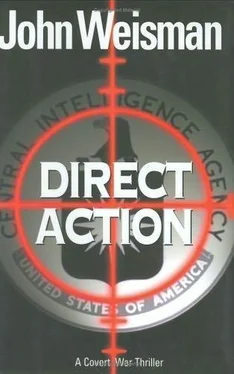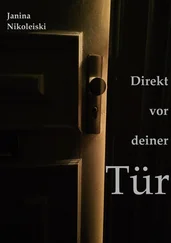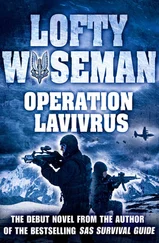“But what you’re talking about is ruthless.”
“Ruthless works, my friend. You have to be pragmatic. Flexible. You Americans forget you are at war. That’s because you think you are eight thousand miles from it, even though you’re not. We live in the middle of the battlefield, my friend.” Salah pulled a pack of Jordanian cigarettes from his pocket, shook one into his mouth, and lit it with a disposable lighter. “That’s how you get actionable intelligence. Stuff you use today, tomorrow, this week.”
“But you said you don’t use those techniques at Qadima.”
“Correct. Here we are interested in the long term. To learn how these people think and why. This woman you came to see-she is no terrorist. We know that. But we want to learn about the man she traveled with. We want to be able to give our security services information that will help them uncover developing capabilities, impending objectives, future trends. And so, we prefer psychological means-yes, we still use light, heat, and cold, sound or the absolute lack of it. But the key is long, intensive, almost psychoanalytic sessions.”
“But she’s British. What about the British consul? Didn’t he demand to see her?”
Salah put his right hand on the edge of the metal desk and exhaled smoke through his nose. “That is not my concern. When those in a position to grant the British consul permission to see this woman do so, she will be moved to another facility.” He swiveled toward Tom. “Our goals here are different. Time is of no concern. We want to extract information right down to the subconscious level. To understand what attracted these people to terrorism-to comprehend not only their motives, but get inside their psyches.”
“When you say long…”
The Israeli switched into French. “Twenty-two, twenty-three hours is common. I have seen interrogations that last more than thirty-two hours-almost a day and a half. And believe me, they are just as hard on the interrogator as they are on the subject.”
Tom followed suit, speaking French. “You don’t tag-team?”
“It doesn’t work if you switch boats in midstream. There has to be a real line of communication developed. Something akin to trust. Like I said, in many ways the process here resembles psychoanalysis. You get inside their heads. You take them back, get them almost fetal, and then bring them forward step-by-step.”
Tom understood Salah’s modus operandi. The agent recruitment process operated under many of the same precepts. The case officer controls the situation by creating and subsequently encouraging the kind of rapport in which the agent quickly becomes dependent on the case officer. Through the ability to read people, the force of personality, and the exploitation of vulnerabilities, the case officer creates a Potemkin Village relationship in which he or she becomes the agent’s best friend, surrogate parent, trusted confessor, and shrink. “Potemkin Village” because it is all an act. The case officer’s every emotion is feigned, every response choreographed in order to manipulate, steer, and influence the target in a certain prescribed direction. At the end of the process, which is called “getting close,” the target will trust the case officer more than he or she will trust their own husbands or wives, families, or the groups to which they belong.
Indeed, if the case officers are sophisticated enough, and flexible enough, and know enough about the culture, mores, and psychological quirks of the target, they can even run this mind game on individuals whose religious and political beliefs might at first appear to be impenetrable and unshakable. Like members of the Muslim Brotherhood or the Da’wa, for example. Tom had recruited members of both vehemently anti-Western Islamist factions as agents. It hadn’t been an overnight process. It had taken more than half a year in one case-that had been a false-flag recruitment-and a local access agent to act as an intermediary in the other. But he had pulled them off.
He looked at the one-armed man who flicked the cigarette from his lips and ground it out with the toe of his boot. This guy knew whereof he spoke.
“Why was I allowed to come here?”
“You are here because Reuven Ayalon vouches for you, and because Reuven has a lot of friends.” He gave Tom a sidelong glance. “I was against it at first. It breaks the rhythm, and we’re almost finished with her. But I was finally convinced that in the long term your visit will bear valuable fruit for us as well as you.”
“Thank you.”
“Don’t be so quick to thank. Besides, Reuven or no Reuven, you are here because I was told you are able to ask questions exactly the way we do-in Arabic or French that doesn’t sound as if it’s being spoken by a Yankee Doodle dandy.”
The words came out “Yenki Duudul dendi.” The Israeli looked at Tom, his face serious. “You speak even your French with a slight Tunisian accent. There is no hint of American in your speech.”
“Is that important?”
Salah shook another cigarette out, put it to his lips, and replaced the pack in his pocket. “It is critical. It is important for some of the detainees to believe they have been shipped somewhere that is not Israel. And so there is no Hebrew spoken anywhere in this facility. No English either. Arabic, French, and sometimes Farsi, Russian, or German.”
“Isn’t that skirting the ethical edge?”
“Ethical? It’s not ethical to murder civilians, my friend. I told you: I am against torture. I am against abuse. But I’ve already been condemned to fight with one sleeve pinned to my shoulder, my friend. I’m not willing to tie my only good hand behind my back, too.” Salah withdrew a greenish bandanna from his coveralls, blew his nose loudly, then stuffed the handkerchief back in his back pocket. “So, we can-and we do without apology-hold detainees in solitary confinement for years if we feel it is necessary. Just like the French, incidentally. In fact, a major factor in our high success rate is the complete isolation in which these terrorists are kept. You Americans tend to coddle prisoners-even terrorists. You cave in to human rights organizations. You allow lawyers, family visits, and other amenities. I cannot believe what I saw when I visited high-security facilities in the United States some years ago. Cable television. Gyms. Libraries. It was like sending your criminals to college.”
“That was a civilian prison.”
“But your so-called white supremacists were incarcerated there alongside rapists and bank robbers. You treat your own terrorists as if they were burglars or carjackers.” Salah’s hand made a dismissive gesture. “Terrorists are not criminals. They are enemy combatants, and they deserve no coddling. You Americans often ignore the realities. That kind of fuzzy thinking pervades your abilities, especially in this kind of total war.” He exhaled smoke through his nose. “Jihad, they call it. All-out effort, remember? Sometimes I think you Americans forget that when you deal with enemy combatants.”
“That’s not what I hear about the ones being held in Afghanistan and Guantánamo.”
“For you, Iraq and Afghanistan are the exceptions to the rule, believe me.” Salah pulled on the collar of his sterile coveralls. “Besides, you Americans have very few trained interrogators.” His black eyes flashed in Tom’s direction. “You had to send more than fifty of your paramilitary people here just after the Kandahar and Baghram facilities were established in Afghanistan because your CIA didn’t have any qualified personnel. Any . Unbelievable. So we had to teach them the basics, believe me. But it didn’t matter, because they all lacked Arabic, not to mention Pashto, or Urdu, or Uzbek. A friend of mine at AMAN 14told me when the 9/11 attacks occurred, there were less than a hundred Arabic-speaking interrogators in your entire army-and perhaps another hundred and fifty in the reserves. And CIA? It was a joke. At the military interrogation center in Kandahar, not a single CIA officer had sufficient Arabic, Pashto, Urdu, or Farsi to do proper interrogations. And yet the most critical element is the ability to speak in the detainee’s native tongue and understand his culture. You cannot do the job using an interpreter.”
Читать дальше












